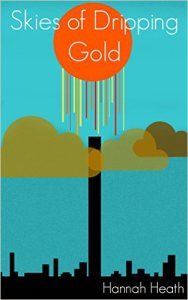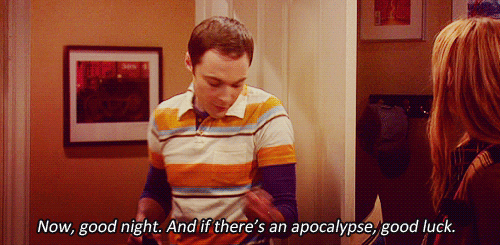Nate Philbrick's Blog, page 13
December 30, 2015
Writerly Plans For 2016
December is coming to a close, as is the calendar year, and it’s been a heck of a ride! As a quick recap, the year 2015 saw…
The (self) publication of my novel, Little One, and a short story, Judgment Wheel, which combined for nearly 1000 total downloads.
My college graduation.
The start of two brand new fantasy novels.
A foray into an assortment of freelance copy editing and translating jobs.
That small-but-sweet 2k follower milestone on Twitter.
The birth of You Write Fiction from the ashes of the old website/blog (as well as a staggering weekly audience growth and nearly 100 total subscribers in just a month!)
The chance to connect with a lot of great people…that means you!
Yep, it’s been a pretty full year. I’m really excited about starting a new one. Here’s a glimpse at the plans I have for 2016, along with a few resolutions…
Blog post reduction
Since launching You Write Fiction back in November, I’ve been posting daily. However, that’s pretty time-consuming, so I’m going to be downscaling to 4-5 posts per week.
More indie reading
One of my goals for 2016 is to read one indie book each week, totalling 52 books by the end of the year. We’ll see if my schedule and my wallet end up approving…
Fantasy novel release
A while back I announced the title of my upcoming fantasy novel, The Children of Falore. I’m working hard at it, and hopefully it’ll be on schedule for a late-April release.
Social media expansion
I’m pretty active on Twitter, and the growth has been evident, but I want to expand to other social media platforms as well. Specifically, I’ll be putting more time/effort into my already-existing Instagram account, as well as trying to get the hang of my Goodreads page once and for all. You should come join me!
What are some of your goals and plans for 2016? If you wish me luck with mine I’ll wish you luck with yours. Thanks for reading!
December 29, 2015
Why You Should Stop Reading Fiction
Imagination leads to ideas, and ideas are dangerous. You should be spending your leisure time on activities that don’t stimulate the power in the human mind.
Reading develops unnecessary language skills
Why expand your vocabulary, enhance your ability to express yourself, and gain higher comprehension skill levels when you can get by just as well with thing, stuff, and cool?
Fiction promotes dangerous critical thinking
The last thing society needs is for people to start questioning why things are the way they are and to realize that not everything is the way it should be. Things will be just fine if you accept the status quo and move on.
Fiction has too many layers of meaning
Why can’t people read more pop-culture magazines and viral websites that spoon-feed them what’s going on in the world? It’s the superficial aspects of humanity that really matter. Fiction tends to dig deeper and explore hard issues of life, and that makes everyone uncomfortable. It’s best avoided.
Fiction makes too many new experiences possible
People need to learn to be satisfied with the humdrum routine of an average citizen’s life. Embrace the fact that excitement and adventure are out of your reach.
Fiction exaggerates the beauty of creativity
Creativity is overrated. Why read a piece of ornate poetry or breath-catching prose when you can pick up a perfectly functional newspaper that doesn’t have all the extra flare and style? Words are meant to communicate, not evoke emotions or flow like music.
Reading is a distraction from the obligations of life
You’re busy, busy, busy. Reading forces you to sit down and catch your breath, and it relaxes your mind and body. You can’t afford that, not when you know your next alarm will go off any second and you’ll have to rush out the door again.


December 28, 2015
10 Random Writing Habits
Every writer has a particular set of habits that he/she abides by, sometimes for no clear reason. Here are ten of mine:
1 – I always write in 500-word chunks and take 5-10 minute breaks between each session.
2 – Out of all the mugs I own, only a select few are my official writing mugs. Two are for coffee, one is for tea.
 Ninja mug always makes sure I’m typing away at my manuscript…
Ninja mug always makes sure I’m typing away at my manuscript…3 – I switch back and forth between a desk-and-chair and a couch or recliner.
4 – I hold my breath when writing intense scenes.
5 – I never write in my bedroom.
6 – Many of my good ideas hit me during long car rides, but if I try to write on the road, I’ll be sick within 30 seconds.
7 – Every so often I’ll get a strong urge to write by hand, so I end up with notebooks full of disjointed scenes.
8 – I always edit a printed copy of my manuscript.
9 – Whenever I stop to think while writing I end up rubbing my jaw. Don’t ask why. I just do.
10 – I almost never touch my manuscript before lunch.
What are some of your writerly habits? Care to share? Drop a comment below! And while you’re at it, don’t forget to subscribe.
Keep calm and write on, friend!
December 27, 2015
Sunday Book Review – Skies of Dripping Gold
Welcome back to Sunday Book Review! Since Christmas celebrations kept me from finishing this week’s novel, today I’m giving my thoughts on a short story I read a few weeks ago: Skies of Dripping Gold, by Hannah Heath.

Skies of Dripping Gold, by Hannah Heath
General Information
Genre according to Amazon: short reads (teen/young adult, christian fantasy).
Length (print): 31 pages.
How I found it: pre-order announcement on author’s website.
Amazon blurb:
In an angry, frightened world where the Poison claims many lives, a young man’s belief in Paradise has collapsed into a distant dream. Gabriel can no longer place his trust in the existence of such a place. Not when his sister’s pain continues to sap her strength. Not when prayers for her healing go unanswered.
As the Poison progresses, eating away at Lilly’s life, Gabriel sets off on a desperate climb to save her from death. Struggling to discover the truth behind a world where the skies drip gold, Gabriel tries to maintain his disbelief in God while clutching after hope for his sister’s salvation. But, as he climbs the cliff that is said to lead to Paradise, he begins to see: if he can’t bring himself to believe in a place of peace and golden skies, then how can he possibly hope for his sister’s rescue? How can he possibly hope for his own?
Amazon Rating: 4.9 stars (20 customer reviews) at the time of article publication.
My Thoughts
Caution: potential minor spoilers ahead, though I’ll do my best to not reveal the ending.
First impression: I pre-ordered Skies of Dripping Gold based on the blurb, which presented an intriguing premise, and a curiosity about Hannah Heath’s writing.
Strengths
The writing: you know those authors whose writing is enjoyable to read simply based on the flow, style, and communication efficiency they pull off? Yeah. This is it.
The power in brevity: as an occasional writer of short stories myself, I know how hard it is to pack both an emotional punch and/or significant content in such a short read. Heath provides both in the space of thirty pages.
The emotion: if you’re not a big fan of feeling excruciating human emotions vicariously through a protagonist, this story probably isn’t for you.
A relatable concept: dystopian stories often revolve around rebellions, grand escapes, and other concepts that are mostly foreign to us except in fiction. At its core, SoDG is a story about a desperate young man and his love for his sister. It’s immediately relatable.
The conclusion: the end of the story isn’t what I would call very final. It doesn’t provide a definite conclusion. What it does provide is a wealth of hope for a character previously plagued by hopelessness, and it’s a wonderful ending. Also, the feels…
The theme: the main idea in SoDG is faith (the pursuit or lack thereof). My main concern going into the story was that it would end up sacrificing quality to convey its message. I was pleased to see it wasn’t that way at all. The message is there, but it’s not preached to death, and it lets (or forces?) the reader to think for himself/herself.
The best: in my opinion, SoDG’s strongest point is the conglomeration of human emotions that it conveys, mostly through the protagonist, Gabriel; but also through Lilly and Cole. The story is raw, rough, and it doesn’t sugarcoat anything.
My favorite line:
As far as he was concerned, there were only two all-important laws on earth: 1. Don’t murder people. 2. Never swear in front of Lilly.
Weaknesses
Heath really puts my disbelief in a perfect story to the test. As in, I’m almost making stuff up here.
For the first several pages I was confused as to Lilly’s age. I pictured her as a little girl, but it turns out she’s actually older than Gabriel. Maybe I missed an age detail at the beginning?
During Gabriel’s climb of the cliff (after already making progress), the remaining distance is estimated to be 3000 feet. I’m not a rock climber, but that seems like a stinking long climb, especially when he completes said 3000 feet with a broken finger.
“Man, Nate, you’re being uber picky about this.” Oh, yeah? I’d like to see you try to find weaknesses in this story…
Conclusion: Skies of Dripping Gold gripped me from the start. Heath’s writing is some of the best I’ve read in a while. Elegant yet clean, purposeful, and rich. The protagonist’s emotions are real, and that’s an accomplishment for a short read. It was almost too quick of an end…almost. Masterful communication. Kudos to Hannah Heath, and I’ll be back for more!
My final rating: 5/5 stars
You can find out more about author Hannah Heath on her website.
Note: there are a handful of swear words in the dialogue. Being a Christian short story, some readers may take offense, but please don’t. They’re few, they’re mild, and they’re used for a very necessary purpose. When your sister’s dying and you’ve given up on a God that’s supposed to love you, ‘well, hot dog!’ just doesn’t cut it.
I paid for my copy of Skies of Dripping Gold and wrote this review without involvement in any exchange or deals. Thoughts and opinions are my own. Yours may differ, and that’s fine. Feel free to drop a comment below!


December 26, 2015
The Writer’s Life According To (Part 2)…Sheldon Cooper
Merry post-Christmas! In the spirit of Saturnalia festivities, I’ve decided to return to the land of gifs. You’ve seen the writer’s life according to Jack Sparrow. Now I present to you the writer’s life according to Sheldon Cooper!
 When someone interrupts your writing session.
When someone interrupts your writing session. Leaving your characters for the night…
Leaving your characters for the night… When you find a typo in your 5th draft.
When you find a typo in your 5th draft. Writer’s block…again…
Writer’s block…again… And when you finally break through it.
And when you finally break through it. When readers yell at you for killing off their favorite character.
When readers yell at you for killing off their favorite character. When someone says they don’t like reading.
When someone says they don’t like reading. When a friend recommends your book in front of you.
When a friend recommends your book in front of you. Trying to be happy for other writers and their 500 good reviews.
Trying to be happy for other writers and their 500 good reviews. “Just because I’m a writer doesn’t mean I don’t have friends…”
“Just because I’m a writer doesn’t mean I don’t have friends…”(All gifs are from giphy.com)


December 24, 2015
We Three Writers – A Very Writerly Christmas!
Hello, readers! So I won’t be posting anything tomorrow (because Christmas, duh), and I’m too caught up in festivities to do anything serious today, so I thought I’d have a little fun and ‘tweak’ a classic Christmas carol. Enjoy!
We Three Writers (a parody of We Three Kings)
by Nate Philbrick
We three writers desperate are
Just two cups of coffee so far
Passive voices, poor word choices
Everything’s under par
** ** **
O what a typo, what a blight!
Surely this the writer’s plight
Red pen bleeding, still proofreading
Yet another sleepless night
** ** **
Weak constructions causing me pain
Start the chapter over again
Draft forever, published never
When did I go insane?
** ** **
O what a typo, what a blight!
Surely this the writer’s plight
Red pen bleeding, still proofreading
Yet another sleepless night
** ** **
Half a book to finish have I
Novel pages piled so high
Adverb-razing, line-rephrasing
Twenty loose ends to tie
** ** **
O what a typo, what a blight!
Surely this the writer’s plight
Red pen bleeding, still proofreading
Yet another sleepless night
Merry Christmas, everybody! See you all after the holiday!


December 23, 2015
10 Things Writers Need To Stop Doing
I’m going to be brief and to the point today. This is a message for every writer out there, myself included. You need to stop…
…Defining success by number of book sales.
…Pressuring yourself to always write well.
…Assuming no one wants to read your work.
…Writing what everyone else is writing just to feed the market.
…Doubting your own talent, skills, and dedication.
…Equating a missed quota or wordless day with failure.
…Getting pulled down by bad reviews or negative criticism.
…Paying attention to unwarranted opinions on what you should or shouldn’t write.
…Trying to write stories and characters that will please everyone.
…Finding excuses to not get back to work and finish that story.

You’re better than all of that. Keep calm and write on, friend.
December 22, 2015
Writing Sad Scenes – Why And How
Why do I want to make my readers sad?
Am I a cruel monster, causing people to spill tears over stories that never happened? Maybe…but it’s so much more than that. There is beauty to be found in sorrow.
Emotions are a beautiful part of what makes us human, both the good and the bad. Sadness is no different. It’s part of who we are. The sad days in our life make the happy ones all the brighter, and we’ve all had days when it just feels right to be sad. It’s hard to explain, but there’s beauty in sorrow.
Just look at the arts: music, visual art, literature, cinema, theatre…why do they all reflect sadness at one point or another if there’s nothing in it to appreciate?
How can I make my readers sad?
Evoking sadness from your reader largely depends on the reader herself. You can’t control what story elements connect with her the most on an emotional level, and sadness is something that can’t be forced. There are, however, a few strategies I like to put to practice to set the tone…
Write what makes you sad
Readers won’t experience an emotion while reading that you didn’t experience while writing. The more you’re convinced your scene is sad, the more it will be. Don’t be afraid to draw from personal experience.
Example: in Little One, much of the emotion stems from the separation of Daniel from his three-year-old sister, Litty. I wrote the original short story when my own little sister was about that age, and drew from the emotions I felt when I said goodbye to her before leaving for college. Also, I’m ridiculously pessimistic and can exaggerate quite well.
Avoid melodrama
You can’t throttle your readers with fancy words, long speeches, and other cliches and hope they’ll be moved to tears.
Manipulate and use your own emotions
Write when you’re tired. A tired mind experiences negative emotions more intensely, and you can translate that onto the page.
Build up with other emotional activities. As cheesy as it sounds, go on Youtube and watch videos that draw on your own emotions, or listen to sad music.
Jumpstarter: the score for Pan’s Labyrinth (Guillermo Del Toro) composed by Javier Navarrete is one of the most beautifully depressing soundtracks I’ve ever heard, and it fueled many of the scenes in Little One.
Set the tone through vocabulary
The words you use should underline the emotion you’re hoping to evoke. All words have connotations, and it’s up to you to figure out what word works best in each situation.
Draw emotion through characters readers care about
Allow readers to spend time with the characters in question before expecting them to feel much emotion when they go through a sad moment. The more your reader knows the character(s), the more personality, history, and relationships you have to work with.
Be yourself
Use the same voice you’ve been using throughout the whole story. Be consistent. Your characters should act, think, and talk the same way they usually do (within the parameters and context of the scene, of course). Take what readers are familiar with in other contexts and use it to your advantage.
Those are just a few strategies that I follow when I need to write a particularly sad scene. What are some of yours? What do you do to tug at readers’ emotions? Tell me in the comments!
Also, a couple years ago I wrote a guest article for Writerology.net called How To Connect Emotionally With Your Readers. Check it out for a broader look at emotions and how to draw them out through plot and character.
Thanks for reading, and if you found this post helpful, don’t forget to share and subscribe! Keep calm and write on, friend.


December 21, 2015
5 Things I Would Tell My Younger Writing Self
I started writing fiction when I was about 10 years old. For those of you who don’t know my age, that was twelve and a half years ago. Do the math.
I still remember the first novel I ever started (and never finished). Since then, I’ve grown A LOT as a writer and a person (I hope). I’ve learned a thing or two about my craft and about myself.
Fun fact: I won my first short story contest when I was twelve. It was a school contest. Mine was the only entry.
If I stumbled upon a time-machine and could go back to visit my younger self, here are five things I would tell myself (from a writer’s perspective):
To 20-year-old me… “Don’t rush. Be patient, be thorough. Write hard, edit harder, proofread hardest.”
To 18-year-old me… “Value humility. You’re good, but you’re not great. Be teachable and study your craft. Don’t assume you know more than the next guy.”
To 16-year-old me… “Finish what you start. Don’t chase new ideas like butterflies. Stick with a project until it’s done, then move on to the next.”
To 14-year-old me… “You’re not Christopher Paolini, so stop trying to be. Relax, have fun, and come up with your own ideas.”
To 10-year-old me… “Don’t let anyone mock you just because you named your main characters Pobo and Button. You do you, kid.”
Fun fact 2: I started my first significant novel project when I was 13. It was an epic fantasy story. I wrote 284 pages and then lost interest. I still have those pages.
If you could go back in time and visit yourself as a young writer, what advice would you take along? Drop a comment below, and don’t forget to share/subscribe!
Keep calm and write on, friend.
December 20, 2015
Sunday Book Review – The Redwood Rebel
Heyo, readers! For the second edition of Sunday Book Review I’ll be giving my thoughts on a book I just finished yesterday: The Redwood Rebel, by Lorna George.

The Redwood Rebel (Lorna George)
General Information
Genre according to Amazon: fantasy, romance.
Length (print): 362 pages.
How I found it: ads and mentions on Twitter and Facebook.
Amazon blurb:
In the aftermath of civil war, the people of Ffion starve. The trade has dwindled, the harvest has failed, and all power belongs to the cruel and corrupt. Those few who could have fled the forest continent for other lands, but most are trapped by their poverty and love of their homeland, with little hope for change. Far beneath Chloris Castle, the rebel Naomi has been incarcerated since the tyrannical Princess Adrienne stole the Redwood Throne. Starved of light and warmth for the past four years, she has had only her rage and determination to keep her going as she both fears and yearns for death to claim her at last. In a violent sweep of fate, she is dragged back into the light once more, the Princess and her Councillor hoping to use her as a pawn against the powerful Dragon King of Koren. Faced with an almost impossible choice, Naomi strikes a deal with her captors that will set her free at last. Unfortunately, she soon finds she has taken on much more than she bargained for.
Amazon Rating: 4.9 stars (10 customer reviews) at the time of article publication.
My Thoughts
Caution: potential minor spoilers ahead, though I’ll do my best to not reveal the ending.
First impression: I read the free sample on Amazon after seeing the book mentioned both on Twitter and Facebook. I liked the tone it set right off the bat, but it was another week or so before I came back and bought the full book. Once I got into the second or third chapter, I was grabbing my Kindle for more every chance I got.
Strengths
Buckle up, boys and girls.
Solid style: let me start out by saying that Lorna George’s writing is impeccable. Not just because it’s 99.9% typo-free, but because there’s evident thought and purpose behind each sentence. It’s the kind of writing that feels good to read. Personally, I found myself becoming a better writer by osmosis.
Brilliant characters: the complexity, depth, and development of the main characters is superb, simply put. More on this later on.
Story-world come alive: Ilios felt like a real world in a way I haven’t encountered in fantasy fiction since Paolini’s Alagaesia. Geography, history, politics, population…it’s there, it’s tangible, and it’s part of the story, not just info-dumps.
Villains: Adrienne is the villain you want to slap across the face. Cygnus is the villain you want to stay very far away from. Both are ‘classic villain’ material without stepping into ‘cliche villain’ territory.
Plot progression: the plot built nicely towards the climactic showdown I was waiting for. It wasn’t terribly complex, but it felt right.
Naomi and Arun: the story revolves primarily around these two characters and their efforts (or lack thereof) to coexist and cooperate in their predicament together. As previously mentioned, both these characters are ridiculously well developed. I found myself understanding, rooting for, and sympathizing with both of them at the same time despite their very different perspectives on the world. Redeemably flawed, admirably noble, and indisputably human, Naomi and Arun are both characters I won’t be forgetting anytime soon.
The fantasy aspect: harpies, dryads, wood sprites, magic, dragons, and more? Heck yeah!
The best: in my opinion, Arun’s character arch is the best part of The Redwood Rebel, because his personal battle with his own flaws is what brings out his greatest strengths, and because I feel he makes the most progress towards completion by the end of the novel.
Weaknesses
Though I firmly believe no book is perfect, I had to dig extra deep in The Redwood Rebel to find any potential flaws (and I use that word very loosely here).
Some slow portions: I felt the characters had a tendency to delve into long paragraphs of retro/introspection when the immediate plot would have benefited from an uninterrupted flow.
Unlikeable protagonist? Okay, hear me out. After I finished reading the book, I spent the better part of an hour trying to convince myself I liked Naomi as a character. She’s proud, harsh, and brittle, and spends most of the book being angry at people. Don’t get me wrong. I know her background and what she’s been through. I get it. I understand her. I sympathize with her. I’m on her side (most of the time). I want her to succeed. But I just can’t like her.
Agenda showing through: there were a few moments (almost purely lines delivered by Naomi, and only two or three instances) that felt like they were shoe-horned in to push an agenda. I think the messages/themes of the book were communicated effectively without those moments/lines.
Conclusion: The Redwood Rebel is one of the best fantasy novels I’ve read in a long time. I can’t emphasize enough just how real these characters are and how much I wanted to see them grow and change from page to page. The weaknesses mentioned above barely make a dent in my enjoyment of the story overall. I’m looking forward to reuniting with Arun and Naomi in the next installment.
My final rating: 4/5 stars
Note: I would give The Redwood Rebel a higher rating (4.5?) if Amazon, Goodreads, etc. allowed for half-star flexibility in their ratings. The book is absolutely worthy of 5 stars, and I’m glad the overall ratings reflect that. If I had been able to fully like Naomi as a protagonist, this would have been a 5 star no-brainer.
I paid for my copy of The Redwood Rebel and wrote this review without involvement in any exchange or deals. Thoughts and opinions are my own. Yours may differ, and that’s fine. Feel free to drop a comment below!













